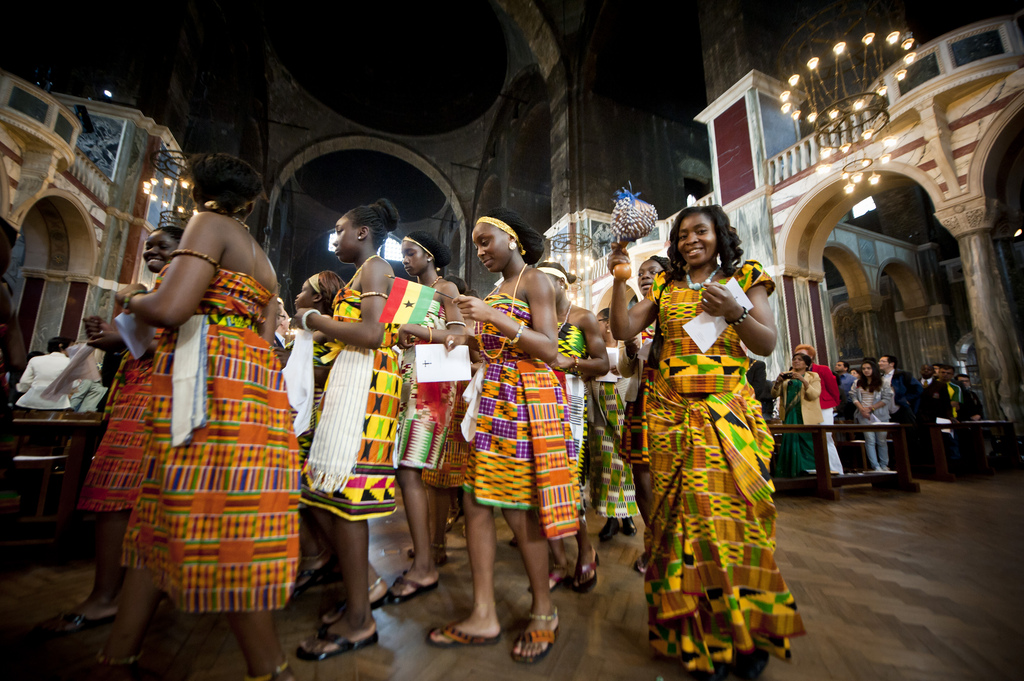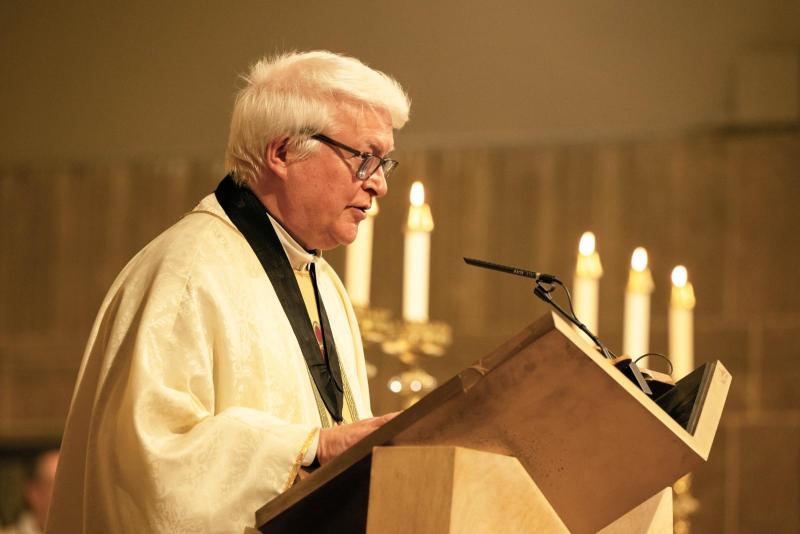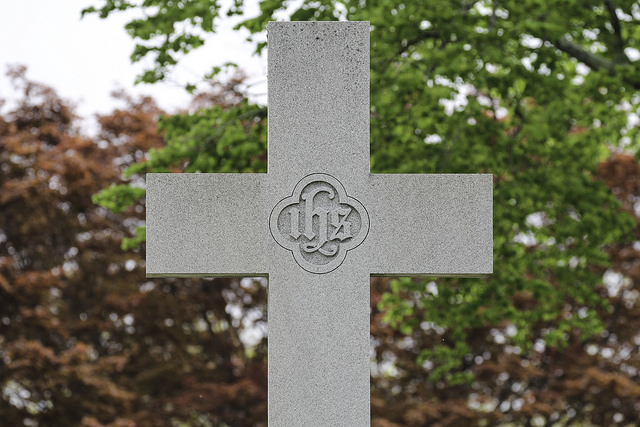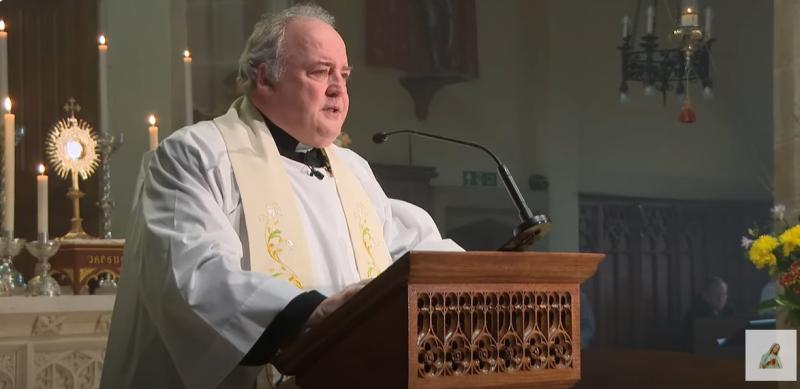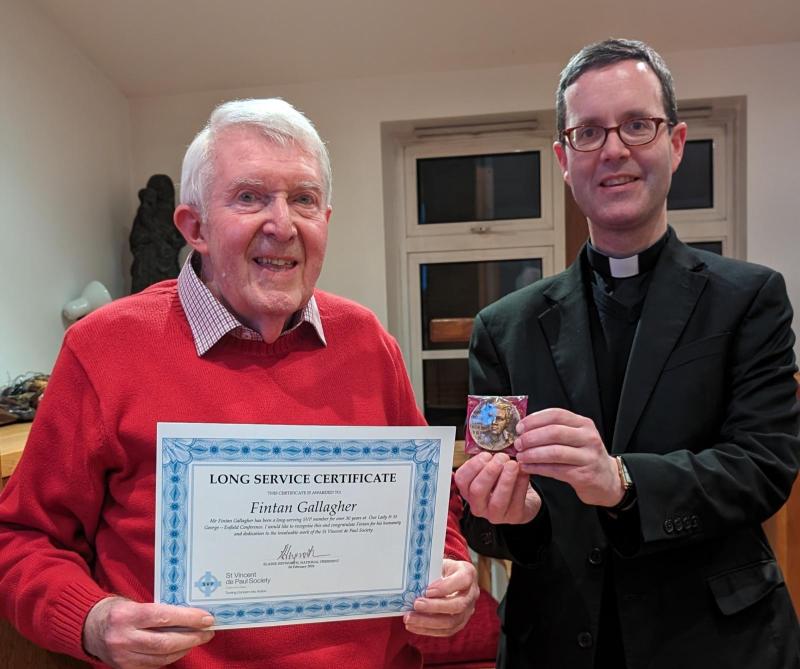Over 2,000 Catholic migrants living and working in London attended a special Mass for Migrants celebrated by the Rt Rev Patrick Lynch, Auxiliary Bishop of Southwark and Chair of the Office for Migration Policy, at Westminster Cathedral on Monday 5 May. The Mass reflected the tremendous diversity of London’s Catholic community, with music from across the globe.
Over 30 dignitaries attended the Mass including the Secretary of State for Business, Innovation and Skills, the Rt Hon Dr Vince Cable MP, as well as other Members of Parliament, Mayors from eight London Boroughs and representatives from ten embassies, including the Ambassadors or High Commissioners of Spain, Sri Lanka, Côte d’Ivoire and Latvia.
The Mass was preceded by a banner procession from the different ethnic communities in national costume, with music provided by a Congolese choir and drummers. Bidding prayers were also offered in seven different languages, including Polish, Mandarin and Swahili.
In his homily Bishop Patrick spoke of the ‘tremendous contribution’ migrants make to both the life of the Church and British society:
“You enrich through the values you live and through the work that you do. Likewise your contribution to the Catholic Church has for many years been immense. For many years parishes up and down the country, but especially in large cities, have benefited from the faith, the joy and prayerfulness of immigrant communities from all over the world.”
Bishop Patrick also talked about the vulnerable situations that migrants can find themselves in, with particular risks being faced by victims of trafficking and undocumented children:
“As a Church, we must also speak out, especially for the poorest and the most vulnerable. Today's Gospel describes the hostile reaction to Jesus' prophetic teachings. His teaching always had both a comforting and a challenging character, always proclaiming the message of hope but always calling his listeners to change and conversion. Likewise we are called to proclaim a message of hope to those who are poor and vulnerable.
“This is a theme very close to the heart of Pope Francis. Again and again in Evangelii Gaudium, he calls us to recognise the suffering of those who experience wars, poverty and vulnerability in our world today. In that way the Church must be especially concerned, and speak out for, two of the most vulnerable migrant groups in our society: victims of trafficking and undocumented children.
“All of us must become more aware of the problem of human trafficking, more courageous in reporting the existence of human trafficking, more generous in supporting those who work with the victims, survivors of human trafficking and more open to working together to eliminate human trafficking.”
The full text of Bishop Patrick's homily:
About two months ago whilst carrying out a visitation in a parish in South London I went into the church about a half an hour before the Sunday evening mass and I noticed a group of six young Filipinos sitting quietly in prayer. I started up a conversation with them and I was surprised to find out that it was their first Sunday in London. They had arrived from the Philippines three days previously and were beginning work at Kings College Hospital the following morning. What struck me immediately was how quickly they had found out where the nearest Catholic Church was and how enthusiastic they were about their faith. Moreover, I was also deeply impressed by the fact that they were all very well qualified in different specialist areas of nursing.
I start with this experience because our Mass today – for the feast of St. Joseph the Worker – is a wonderful opportunity to celebrate and appreciate the tremendous contribution that migrants make to our Church and to our society not only here in London but throughout the country and secondly it is an opportunity to speak up for and to speak out for the most vulnerable migrants living here in the U.K.
It is important, first of all, to affirm the tremendous contribution migrants are making to our society and to our Church here in London. You enrich our society through the values you live and through the work you do. Your dedication to national institutions like the National Health Service - as doctors and nurses but also as carers and cleaners - is invaluable. You have been willing to take on low paid jobs in catering and cleaning, in domestic service and agriculture and in fish and food processing and you have been willing to work in difficult and sometimes dangerous work in the fishing industry. The Church recognises and appreciates the work you do and the gifts you bring. We must, as Pope Francis says in Evangelii Gaudium, “overcome paralysing mistrust and integrate those who are different” (no 210). We cannot accept the attitude of some who criticize migrant workers especially from Eastern Europe but at the same time are willing for society to benefit from the hard work and very often the low pay of migrant workers on the other. In today’s first reading we are reminded that we are all made in God’s image and we are all called to cooperate with God in building a better world together. It is important, therefore, that we continue to create a society that is fully integrated both socially and culturally.
Likewise, your contribution as migrants to the Catholic Church has for many years been immense. For many years our parishes up and down the country but especially in the large cities have benefited from the faith, the joyfulness and the prayerfulness of immigrant communities from all over the world – first from Ireland and Italy, then from the West Indies and Poland, from the Philippines and other parts of Asia and most recently from Africa, Eastern Europe and South America. While immigration does present challenges – both social and cultural – it is important to recognise how we as a Church have been tremendously enriched by the presence and prayer of migrant communities. Let me give you one specific example.
A few weeks ago I attended a wonderful concert in St. Peter’s Church in Woolwich in South London. Six Gospel choirs representing four Catholic schools and one parish presented an inspiring programme of Gospel music. The church was packed. Over two hundred and fifty young people participated (ninety percent of whom were of an African background), inspiring us with a wonderful repertoire of hymns. For me it was a wonderful example of how migrant communities have brought new life to our worship and reminded us that worship and prayer must come first and foremost from the heart if it is to touch the hearts of others and indeed attract others.
As a Church we must also speak out on behalf of migrants - especially the poorest and the most vulnerable. In today’s Gospel Matthew describes the hostile reaction evoked by Jesus’ prophetic teaching. His teaching always had both a comforting and a challenging character – always proclaiming a message of hope but always calling his listeners to change and conversion. Jesus always presents us with a choice and we can respond positively like true disciples or negatively like the people of Jesus’ home village.
Likewise, we too are called to proclaim a message of hope to those who are poor and vulnerable. This is a theme very close to the heart of Pope Francis. Again and again in Evangelii Gaudium and in his homilies he calls us to recognize the suffering Christ in those who are experiencing new forms of poverty and vulnerability in the world today. In that regard, I believe that the Church here in England and Wales must be especially concerned about and speak up for two of the most vulnerable migrant groups in our society – the victims of trafficking and undocumented children.
At a recent conference in Rome on Combating Human Trafficking Pope Francis himself described human trafficking as “an open wound on the Body of Christ”. In Evangelii Gaudium he invited us “to open our eyes and see our brothers and sisters who are enslaved in clandestine workshops, in rings of prostitution, in children used for begging, in exploiting undocumented labour”. Not all trafficking takes place across international borders but a considerable amount of trafficking does. All of us must, therefore, become more aware of the problem of human trafficking, more courageous in reporting the existence of human trafficking, more generous in supporting those who work with the victims and survivors of trafficking and more open to working together to eliminate human trafficking. I would like, therefore, to commend Her Majesty’s Government on the recent introduction of the Bill on Human Slavery and I warmly welcome its commitment to combat and eliminate human slavery and trafficking.
Secondly, the recent report “No Way In, No Way Out” highlights the very difficult situation that thousands and thousands of undocumented children - children of irregular migrants - are facing in the U.K. at this present time. Many have been born in this country or have lived nearly all their lives here. They seem to be caught between conflicting policy agendas – namely the protection of children’s rights on the one hand and the enforcement of immigration control on the other. I would ask the Government to look as a matter of urgency at possible proposals which might provide effective and workable pathways for undocumented migrant children to have their legal status regularised.
In conclusion, in today’s Mass we celebrate and appreciate the wonderful contribution that migrant workers make to our city, to our society and to our Church but we also pray that God will give us the courage to be ‘the sign of hope and compassion’ that Pope Francis calls us to be – welcoming, helping and speaking up for the most vulnerable in our world today.
